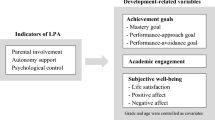Abstract
In a seven week quasi-experimental study, parents (n = 15) of elementary school students (n = 15) learned autonomy supportive communication techniques that included helping their children set learning goals for homework assignments. Treatment vs. comparison group (n = 30) ANCOVA analyses revealed that the parents in the treatment group perceived their children as becoming more autonomously motivated relative to the comparison group, F(1, 26) = 7.69, p < .05. Children in the treatment group reported increased positive affect toward homework relative to the comparison group, F(1,26) = 5.35, p < .05. Children did not significantly improve on general measures of self reported academic intrinsic motivation or relative autonomy. These preliminary findings suggest that autonomy supportive parenting styles may improve parent’s perceptions of their children’s autonomous motivation and children’s subjective experience of positive affect surrounding homework. In order to draw firmer conclusions about the effects of the intervention, more rigorously controlled studies will be needed in the future.
Similar content being viewed by others
References
Assemany, A. E., & McIntosh, D. E. (2002). Negative treatment outcomes of behavioral parent training programs. Psychology in the Schools, 39(2), 209–219.
Bandura, A. (2001). Social cognitive theory: An agentic perspective. Annual Review of Psychology, 52, 1–26.
Battistich, V., Schaps, E., Watson, M., & Solomon, D. (1996). Prevention effects of the child development project: Early findings from an ongoing multisite demonstration trial. Journal of Adolescent Research, 11, 12–35.
Blackwell, L. S., Trzesniewski, K. H., & Dweck, C. S. (2007). Implicit theories of intelligence predict achievement across an adolescent transition: A longitudinal study and an intervention. Child Development, 78, 246–263.
Brophy, J. (2004). Motivating students to learn (2nd ed.). Mahwah, NJ: Lawrence Erlbaum.
Brophy, J. (2008). Developing students’ appreciation for what is taught. Educational Psychologist, 43(3), 132–141.
Brown, D., Pryzwansky, W. B., & Schulte, A. C. (2001). Psychological consultation: Introduction to theory and practice (5th ed.). Boston: Allyn & Bacon.
Conti, R., Amabile, T. M., & Pollak, S. (1995). The positive impact of creative activity: Effects of creative task engagement and motivational focus on college students’ learning. Personality and Social Psychology Bulletin, 21(10), 1107–1116.
Cooper, H., Lindsay, J. J., & Nye, B. (2000). Homework in the home: How student, family, and parenting-style differences relate to the homework process. Contemporary Education Psychology, 25, 464–487.
Cooper, H., Robinson, J. C., & Patall, E. A. (2006). Does homework improve academic achievement? A synthesis of research, 1987–2003. Review of Education Research, 76, 1–62.
Corno, L. (1996). Homework is a complicated thing. Educational Researcher, 25, 27–30.
Coutts, P. M. (2004). Meanings of homework and implications for practice. Theory into Practice, 43, 182–188.
Deci, E. L., Driver, R. E., Hotchkiss, L., Robbins, R. J., & Wilson, I. M. (1993). The relation of mothers’ controlling vocalizations to children’s intrinsic motivation. Journal of Experimental Child Psychology, 55, 151–162.
Gottfried, A. E. (1986). Chidlren’s academic intrinsic motivation inventory. Odessa, FL: Psychological Assessment Resources.
Gottfried, A. E. (1990). Academic intrinsic motivation in young elementary school children. Journal of Educational Psychology, 82(3), 525–538.
Gottfried, A. E., Fleming, J. S., & Gottfried, A. W. (1994). Role of parent motivational practices in children’s academic intrinsic motivation and achievement. Journal of Educational Psychology, 86(1), 104–113.
Gottfried, A. E., Fleming, J. S., & Gottfried, A. W. (2001). Continuity of academic intrinsic motivation from childhood through late adolescence: A longitudinal study. Journal of Educational Psychology, 93(1), 3–13.
Grant, H., & Dweck, C. S. (2003). Clarifying achievement goals and their impact. Journal of Personality and Social Psychology, 85(3), 541–553.
Grolnick, W. S. (2009). The role of parents in facilitating autonomous self-regulation for education. Theory and Research in Education, 7, 164–173.
Grolnick, W. S., Gurland, S. T., DeCourcey, W., & Jacob, K. (2002). Antecedents and consequences of mothers’ autonomy support: An experimental investigation. Developmental Psychology, 38(2), 143–155.
Grolnick, W. S., & Pomerantz, E. M. (2009). Issues and challenges in studying parental control: Toward a new conceptualization. Child Development Perspectives, 3, 165–170.
Gurland, S. T., & Grolnick, W. S. (2005). Perceived threat, controlling parenting, and children’s achievement orientations. Motivation and Emotion, 29, 103–121.
Harris, J. D., Gray, B. A., Rees-McGee, S., Carroll, J. L., & Zaremba, E. T. (1987). Referrals to school psychologists: A national survey. Journal of School Psychology, 25, 343–354.
Joussemet, M., Landry, R., & Koestner, R. (2008). A self-determination theory perspective on parenting. Canadian Psychology, 49, 194–200.
Kasser, T., & Ryan, R. M. (1996). Further examining the American dream: Differential correlates of intrinsic and extrinsic goals. Personality and Social Psychology Bulletin, 22(3), 280–287.
Kenny-Benson, G. A., & Pomerantz, E. M. (2005). The role of mothers’ use of control in children’s perfectionism: Implications for the development of children’s depressive symptoms. Journal of Personality, 73, 23–46.
Lepper, M. R., Corpus, J. H., Henderlong, J., & Iyengar, S. S. (2005). Intrinsic and extrinsic motivational orientations in the classroom: Age differences and academic correlates. Journal of Educational Psychology, 97(2), 184–196.
Lochman, J. E. (2000). Theory and empiricism in intervention research: A dialectic to be avoided. Journal of School Psychology, 38(4), 359–368.
Marcoulides, G. A., Gottfried, A. E., Gottfried, A. W., & Oliver, P. H. (2008). A latent transition analysis of academic intrinsic motivation from childhood through adolescence. Educational Research and Evaluation, 14, 411–427.
Munoz, M. A., & Vanderhaar, J. E. (2006). Literacy-embedded character education in a large urban district: Effect of the Child Development Project on elementary school students and teachers. Journal of Research in Character Education, 4(1–2), 47–64.
Ng, F. F., Kenney-Benson, G. A., & Pomerantz, E. M. (2004). Children’s achievement moderates the effects of mothers’ use of control and autonomy support. Child Development, 75, 764–780.
Rawsthorne, L. J., & Elliot, A. J. (1999). Achievement goals and intrinsic motivation: A meta-analytic review. Personality and Social Psychology Review, 3(4), 326–344.
Reiss, S. (2004). Multifaceted nature of intrinsic motivation: The theory of 16 basic desires. Review of General Psychology, 8, 179–193.
Reiss, S. (2009). Six motivational reasons for low school achievement. Child & Youth Care Forum, 38, 219–225.
Rigby, C. S., Deci, E. L., Patrick, B. C., & Ryan, R. M. (1992). Beyond the intrinsic-extrinsic dichotomy: Self-determination in motivation and learning. Motivation and Emotion, 16, 165–185.
Ryan, R. M., & Connell, J. P. (1989). Perceived locus of causality and internalization: Examining reasons for acting in two domains. Journal of Personality and Social Psychology, 57(5), 749–761.
Ryan, R. M., & Deci, E. L. (2000). Intrinsic and extrinsic motivations: Classic definitions and new directions. Contemporary Educational Psychology, 25, 54–67.
Sansone, C., & Morgan, C. (1992). Intrinsic motivation and education: Competence in context. Motivation and Emotion, 16(3), 249–270.
Sciutto, M. J., Nolfi, C. J., & Bluhm, C. (2004). Effects of child gender and symptom type on referrals for ADHD by elementary school teachers. Journal of Emotional and Behavioral Disorders, 12, 247–253.
Sterling-Turner, H. E., Watson, T. S., Wildmon, M., Watkins, C., & Little, E. (2001). Investigating the relationship between training type and treatment integrity. School Psychology Quarterly, 16(1), 56–67.
Vansteenkiste, M., Lens, W., & Deci, E. L. (2006). Intrinsic versus extrinsic goal contents in self-determination theory: Another look at the quality of academic motivation. Educational Psychologist, 41, 19–31.
Webster-Stratton, C., & Herbert, M. (1993). What really happens in parent training? Behavior Modification, 17(4), 407–456.
Acknowledgments
The author would like to thank the late Jere Brophy for repeatedly sharing insight regarding the application of motivational theories. Mark L. Davison provided helpful consultation regarding statistical analyses. Evelyn Oka, Eugene Pernell, Jr., and Mark Reckase also provided helpful comments while serving on the dissertation committee. Appreciation is extended to the schools, parents, and children who supported or participated in this study.
Author information
Authors and Affiliations
Corresponding author
Additional information
This article is based on a doctoral dissertation completed at Michigan State University by John Mark Froiland under the supervision of Jere Brophy.
This article is dedicated in memory of Jere Brophy, who made priceless contributions to the fields of educational psychology, teacher education, developmental psychology, school psychology, and motivational science.
Rights and permissions
About this article
Cite this article
Froiland, J.M. Parental Autonomy Support and Student Learning Goals: A Preliminary Examination of an Intrinsic Motivation Intervention. Child Youth Care Forum 40, 135–149 (2011). https://doi.org/10.1007/s10566-010-9126-2
Published:
Issue Date:
DOI: https://doi.org/10.1007/s10566-010-9126-2




